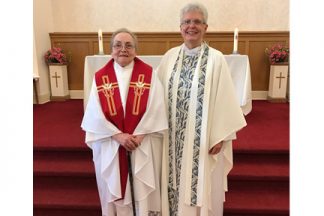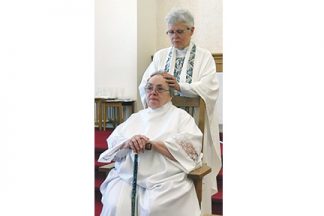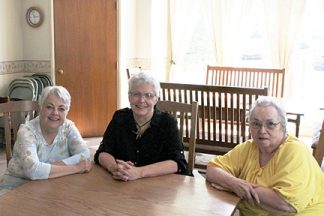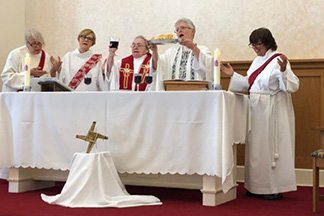Women priests in Brecksville offer alternative to traditional Roman Catholic Church
by Jacqueline Mitchell
Located in a single room inside the Brecksville United Church of Christ, a group of women is challenging the way the Roman Catholic Church looks at priesthood.
“We’re more like prophetic witnesses in this time,” said the Rev. Mary Eileen Collingwood. “Even if the Vatican does not recognize us, we know that we’re preparing the way forward to open up an avenue for future generations. This is the alternative people have been waiting for.”
Collingwood, a Boston Heights resident, is one of five ordained women priests in Northeast Ohio. Together, they make up the Community of St. Bridget, headquartered in the main parlor room of Brecksville United Church of Christ, 23 Public Square. Every Saturday at 5 p.m., the community gathers around a table, sometimes bringing in extra chairs and benches, to celebrate the liturgy of the Eucharist.
The modest room holds up to 40 people. On Christmas and Easter, the community celebrates Mass in the church’s sanctuary. Attendance varies, ranging from as few as six to as many as 30. Collingwood estimates that two-thirds are women.
The community’s origins
CSB was formed in 2012, spurred by unrest regarding the Vatican’s stance against the ordination of women.
“Several of us got together from all over the northern Ohio area who were no longer feeling comfortable with the traditional institutional church,” said Pam Carson, a member of CSB’s leadership team and Bay Village resident.
The group found out that a female priest from Chicago was visiting Cleveland to officiate a Mass.
“For many of us, that was the first time that we had ever heard of a woman priest,” said Carson.
Encouraged, the group asked her to come back to the area to officiate more Masses.
“After that, we started gaining more people and becoming more familiar with the ordained female priest movement,” Carson said.

The community evolved into an online support group that provided information about progressive Catholic communities and the ordination of women. Inspired by the work of the Rev. Dagmar Celeste of Cleveland, members gathered to discuss ways to support women who felt called to the Roman Catholic priesthood.
In September 2013, the Rev. Ann Poelking Klonowski of Independence became the first of the group to be ordained a priest at Brecksville United Church of Christ. Collingwood was ordained a priest at Brecksville UCC in May 2014 and was ordained a bishop in September 2015.
“It was difficult to find places to have Mass, because the Catholic Church institutionally won’t welcome us,” said Carson. “So, someone had a connection here [Brecksville UCC]. This is a very open, very thoughtful community.”
Brecksville UCC’s pastor, the Rev. David Shackle, offered the church’s main parlor room for CSB to celebrate the Liturgy of the Eucharist. At first, the group had Mass at the church once a month, and after Collingwood was ordained, it became weekly.
In 2015, CSB was granted tax exemption as a 501(c)3.
Excommunication from the church
An early member of CSB came up with the name when the organization was still in its virtual support group stage. St. Bridget was purported to be the first bishop, said Carson.
“I think it’s important to note that she was chosen … because the spirit of women continues to go forward. And at different times, it peaks through history. But this is the time. This is the time for women priests,” said Collingwood. “We know that the Vatican is not ready for this, because they still hold on to their man-made laws, but at the same token, it doesn’t matter.”
Those man-made laws, she said, mandated the excommunication of all female priests from the Roman Catholic Church.
“We don’t abide or really take it too seriously, because we know that a bishop in good standing with Rome ordained our bishops, and we are in apostolic succession validly,” Collingwood said. “… We don’t even say we consider our ordinations valid; we know they are.”
The calling
The Rev. Susan Guzik of Eastlake is the most recent member of CSB to be ordained a priest on June 30 at Brecksville UCC. She had been ordained a deacon in May 2014.
CSB priests follow the same ordination process that priests follow in the Roman Catholic Church, said Collingwood.
Guzik felt the call to deepen her role in the church early in life, she said. She is the mother of five children; Collingwood is the mother of seven. Both were extremely active in their Roman Catholic parishes before leaving to become ordained and have strong backgrounds in theology. The pair has been friends for years; they were both certified lay ecclesial ministers in the Catholic Diocese of Cleveland.
Collingwood earned her master’s degree in theology from St. Mary Seminary and Graduate School of Theology. She was a high school teacher and college professor, and she served as a pastoral minister and director of a diocesan office.
Guzik was active in her church for 55 years. She started a parish pastoral council and served on the spiritual life, education and parish life commissions. She was one of the first women lectors in her church.

Collingwood left her church when a priest said the two gravest sins in the world were clergy-child sex abuse and women who wanted to be ordained.
“My husband looked at me, and I looked at him, and he said, ‘We’re out of here,’ and we got up and walked out,” she said.
Inclusivity
CSB dubs itself an inclusive Catholic community. Its mission statement emphasizes that all are welcome, regardless of social, educational, political or economic status, gender, sexual orientation, age, race or religion.
The liturgy follows the same pattern as the Roman Catholic church, “but we use different words, because they’re more inclusive words, they’re more spirit-filled words, they’re more related to our world and not somewhere up there with a funny, antiquated vocabulary,” said Collingwood.
CSB priests provide all sacramental celebrations: weddings (including same-sex marriages), funerals, baptism, confirmation, reconciliation and anointing of the sick.
The community has avoided taking a stance on the hot-button issue of abortion, because Collingwood – who once worked for a pro-life organization – said it would do nothing but divide. When people ask about the topic, she says, “Life should be protected, and it is wrong to not protect life. … But if women were treated with equality and respect, and not as second-class citizens, this abortion issue would maybe not go away, but it would certainly plummet. People would be looking at it very differently.”
Collingwood said the biggest difference between CSB and the Roman Catholic Church is that the community does not practice atonement theology.
“We’re not believing that we were created sinful; we were created good,” she said. “It’s an original blessing and not an original sin. … Our vocabulary and our prayer reflect that.”
Feedback
Collingwood said there’s been little response to CSB from the Brecksville community.
“We haven’t had any pickets, protests, any letters, nothing,” she said.
She, Carson and Guzik agreed that Brecksville UCC has been extremely welcoming from day one.
However, Collingwood said of her role, “It’s not for the faint of heart.”
Before she was ordained, she wrote letters to six priests she was close to, as well as her siblings and in-laws, explaining her calling to become a priest. Her siblings consulted their pastors, who told them not to accept communion at Collingwood’s ordination. Collingwood recalled that during the ceremony, they sat in the choir loft, and when a priest approached to give them communion, they refused.
“They looked at me askance for a long, long time,” she said.
She said the only person who backed her during the entire journey was her father, who passed away in 2016.
On the contrary, Guzik said her children and sisters were supportive of her path. The only negative feedback she’s gotten was from a member of her pinochle league.
“She said, ‘I love you dearly, but I don’t agree with what you’re doing. I think you should be working within the Catholic Church. I would only go to a male priest for communion.’ And I said, ‘I love you dearly, and I don’t care how you feel, but this is how I feel.’ And she’s still my friend.”
Future
CSB encourages home and neighborhood liturgies, and the priests will visit homes to officiate and allow others to get a taste of what the community has to offer.
“That hasn’t blossomed yet, but I really think it’s down the pipeline for us,” Collingwood said.
Looking toward the future, the members of CSB hope to expand their ministry and attract more young people who have turned away from the traditional church.

“As the institutional church continues to lag behind and stick their heels in, more and more people will be searching for other avenues of expression of faith,” said Collingwood.
Carson she’s hopeful for the future.
“I believe I will never see in my lifetime the church accept women,” she said. “But you have to start someplace, and I think maybe grandchildren will be able to attend a Mass in a Catholic parish run by a female priest or staffed by a group of female priests. It’s going to happen someday. And I think that at least I’ve lived long enough to see the walls of the church starting to crumble.”
For more information, visit communityofstbridget.org.
Where did the women priest movement get its origins?
by Jacqueline Mitchell
The women priest movement began when Christine Mayr-Lumetzberger, a former Benedictine nun, gathered a group of like-minded women in Europe and began a program of study to become ordained. In 2002, some Roman Catholic bishops took a risk and stepped forward to ordain seven of these women, including Mayr-Lumetzberger and Dagmar Celeste of Cleveland, the only woman in the group from the United States. These women later became known as the “Danube Seven.”
Today there are almost 260 ordained women worldwide. The group has separated into two branches: the Association of Roman Catholic Women Priests (which Community of St. Bridget members Mary Eileen Collingwood and Susan Guzik are a part of) and the Roman Catholic Womenpriests (which CSB member Ann Poelking Klonowski is a part of). The former has a circle leadership team, and all members weigh in on important decisions through online voting, while the latter answers to a board of directors.
Featured image photo caption: Kathleen Sauline, Gerry Lococo, Guzik, Collingwood andToni-Kay Attanasio celebrate the Eucharist. Sauline, Lococo and Attanasio were ordained deacons. Guzik, Collingwood and Sauline are part of the Brecksville-based Community of St. Bridget, which is served by Roman Catholic women priests. Photo courtesy M. Collingwood

